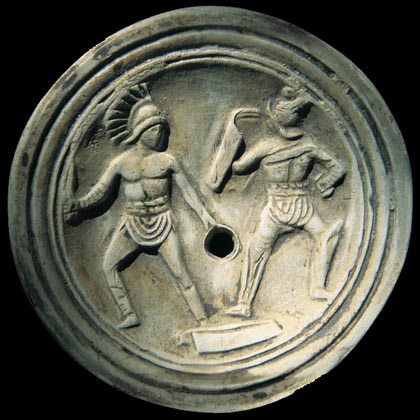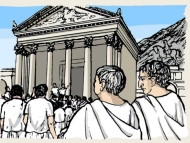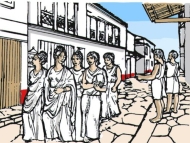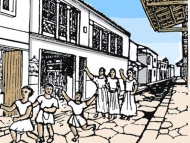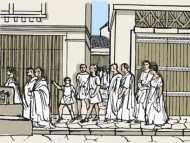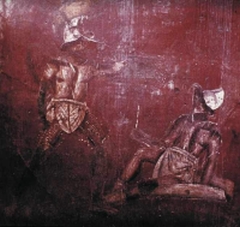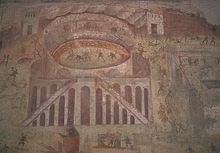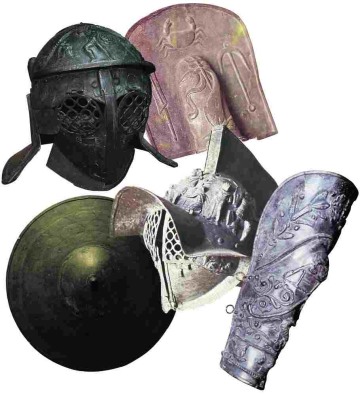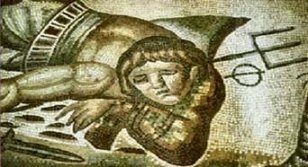1nūntiī spectāculum
nūntiābant.
Pompēiānī nūntiōs audiēbant.
2gladiātōrēs per viam
prōcēdēbant.
Pompēiānī gladiātōrēs
laudābant.
3puellae iuvenēs salūtāvērunt.
iuvenēs quoque ad
amphitheātrum
contendēbant.
4servī fēminās spectābant,
quod fēminae ad
spectāculum contendēbant.
5puerī per viam festīnābant.
puellae puerōs salūtāvērunt.
6Pompēiānī tabernās nōn
intrābant, quod tabernae
erant clausae.
amphitheātrum
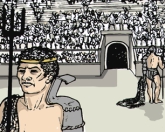
7postquam gladiātōrēs
Pompēiānōs salūtāvērunt,
Pompēiānī plausērunt.
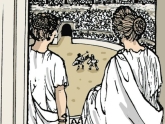
8Pompēiānī gladiātōrēs intentē
spectābant, quod gladiātōrēs
in arēnā pugnābant.
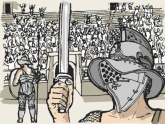
9spectātōrēs murmillōnēs
incitābant, quod murmillōnēs
saepe victōrēs erant.
gladiātōrēs
Rēgulus erat senātor Rōmānus. in vīllā magnificā habitābat. vīlla
erat prope Nūceriam. Nūcerīnī et Pompēiānī erant inimīcī.
Nūcerīnī, quod amphitheātrum nōn habēbant, saepe ad
amphitheātrum Pompēiānum veniēbant; saepe erant turbulentī.
Rēgulus ōlim spectāculum splendidum in amphitheātrō ēdidit,5
quod diem nātālem celebrābat. multī Nūcerīnī igitur ad urbem
vēnērunt. cīvēs Pompēiānī erant īrātī, quod Nūcerīnī viās
complēbant. omnēs tamen ad forum contendērunt, ubi nūntiī
stābant. nūntiī spectāculum optimum nūntiābant:
“gladiātōrēs adsunt! vīgintī gladiātōrēs hodiē pugnant! rētiāriī10
adsunt! murmillōnēs adsunt! bēstiāriī bēstiās ferōcēs agitant!”
Nūcerīnī, postquam nūntiōs audīvērunt, ad amphitheātrum
quam celerrimē contendērunt. Pompēiānī quoque ad
amphitheātrum festīnāvērunt. hī Pompēiānī Nūcerīnōs et
Rēgulum vituperābant, quod Nūcerīnī erant turbulentī. omnēs15
vehementer clāmābant. cīvēs, tamen, postquam amphitheātrum
intrāvērunt, tacuērunt. prīmam pugnam exspectābant.
| senātor Rōmānus | Roman senator |
| magnificā | magnificent |
| Nūceriam | Nuceria (a town near Pompeii) |
| Nūcerīnī | the people of Nuceria |
| inimīcī | enemies |
| saepe | often |
| turbulentī | rowdy, disorderly |
| spectāculum | show, spectacle |
| splendidum | splendid |
| ēdidit | presented |
| diem nātālem | birthday |
| celebrābat | was celebrating |
| cīvēs | citizens |
| complēbant | were filling |
| nūntiābant | were announcing |
| vīgintī | twenty |
| rētiāriī | retiarii, net-fighters |
| murmillōnēs | murmillones, heavily armed gladiators |
| bēstiāriī | beast-fighters |
| bēstiās | wild animals, beasts |
| quam celerrimē | as quickly as possible |
| hī | these |
| vehementer | loudly, violently |
| tacuērunt | fell silent |
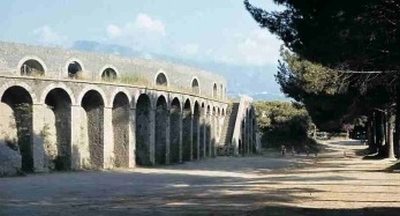 The amphitheater at Pompeii. Notice one of the staircases that led up to the top seats. The public sports ground is behind the trees on the right. On performance days, the open space would have been full of stalls selling refreshments and souvenirs.
The amphitheater at Pompeii. Notice one of the staircases that led up to the top seats. The public sports ground is behind the trees on the right. On performance days, the open space would have been full of stalls selling refreshments and souvenirs.
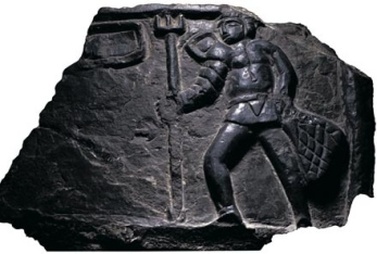
A retiarius with his trident, net, and protection for his right arm and neck.
in arēnā
duo rētiāriī et duo murmillōnēs arēnam intrāvērunt. postquam
gladiātōrēs spectātōrēs salūtāvērunt, tuba sonuit. tum gladiātōrēs
pugnam commīsērunt. murmillōnēs Pompēiānōs valdē
dēlectābant, quod saepe victōrēs erant. Pompēiānī igitur
murmillōnēs incitābant. sed rētiāriī, quod erant expedītī,
5
murmillōnēs facile ēvītāvērunt.
“rētiāriī nōn pugnant! rētiāriī sunt ignāvī!” clāmāvērunt
Pompēiānī. Nūcerīnī tamen respondērunt, “rētiāriī sunt callidī!
rētiāriī murmillōnēs dēcipiunt!”
murmillōnēs rētiāriōs frūstrā ad pugnam prōvocāvērunt. tum10
murmillō clāmāvit, “ūnus murmillō facile duōs rētiāriōs superat.”
Pompēiānī plausērunt. tum murmillō rētiāriōs statim petīvit.
murmillō et rētiāriī ferōciter pugnāvērunt. rētiāriī tandem
murmillōnem graviter vulnerāvērunt. tum rētiāriī alterum
murmillōnem petīvērunt. hic murmillō fortiter pugnāvit, sed15
rētiāriī eum quoque superāvērunt.
Pompēiānī, quod īrātī erant, murmillōnēs vituperābant;
missiōnem tamen postulābant, quod murmillōnēs fortēs erant.
Nūcerīnī mortem postulābant. omnēs spectātōrēs tacēbant et
Rēgulum intentē spectābant. Rēgulus, quod Nūcerīnī mortem20
postulābant, pollicem vertit. Pompēiānī erant īrātī, et vehementer
clāmābant. rētiāriī tamen, postquam Rēgulus signum dedit,
murmillōnēs interfēcērunt.
| tuba | trumpet | prōvocāvērunt | challenged |
| sonuit | sounded | ūnus | one |
| pugnam | | graviter | seriously |
| commīsērunt | began the fight | vulnerāvērunt | wounded |
| victōrēs | victors, | alterum | the second, |
| winners | | the other |
| expedītī | lightly armed | hic | this |
| ēvītāvērunt | avoided | missiōnem | release |
| ignāvī | cowards | mortem | death |
| callidī | clever, smart | pollicem vertit | turned his |
| dēcipiunt | are deceiving, | | thumb up |
| are tricking | dedit | gave |
| frūstrā | in vain | interfēcērunt | killed |
vēnātiō
When you have read this story, answer the questions opposite.
postquam rētiāriī ex arēnā discessērunt, tuba iterum sonuit. subitō
multī cervī arēnam intrāvērunt. cervī per tōtam arēnam currēbant,
quod perterritī erant. tum canēs ferōcēs per portam intrāvērunt.
canēs statim cervōs perterritōs agitāvērunt et interfēcērunt.
postquam canēs cervōs superāvērunt, lupī arēnam intrāvērunt.
5
lupī, quod valdē ēsuriēbant, canēs ferōciter petīvērunt. canēs erant
fortissimī, sed lupī facile canēs superāvērunt.
Nūcerīnī erant laetissimī et Rēgulum laudābant. Pompēiānī
tamen nōn erant contentī, sed clāmābant, “ubi sunt leōnēs? cūr
Rēgulus leōnēs retinet?10
Rēgulus, postquam hunc clāmōrem audīvit, signum dedit.
statim trēs leōnēs per portam ruērunt. tuba iterum sonuit. bēstiāriī
arēnam audācissimē intrāvērunt. leōnēs tamen bēstiāriōs nōn
petīvērunt. leōnēs in arēnā recubuērunt. leōnēs obdormīvērunt!
tum Pompēiānī erant īrātissimī, quod Rēgulus spectāculum15
rīdiculum ēdēbat. Pompēiānī Rēgulum et Nūcerīnōs ex
amphitheātrō agitāvērunt. Nūcerīnī per viās fugiēbant, quod
valdē timēbant. Pompēiānī tamen gladiōs suōs dēstrīnxērunt et
multōs Nūcerīnōs interfēcērunt. ecce! sanguis nōn in arēnā sed per
viās fluēbat.20
| iterum | again |
| cervī | deer |
| ēsuriēbant | were hungry |
| retinet | is holding back |
| hunc | this |
| trēs | three |
| audācissimē | very boldly |
| recubuērunt | lay down |
| obdormīvērunt | went to sleep |
| īrātissimī | very angry |
| rīdiculum | ridiculous, silly |
| ēdēbat | was presenting |
| fugiēbant | began to run away, began to flee |
| suōs | their |
| dēstrīnxērunt | drew |
Questions
1What two things happened after the retiarii left the arena?
2How did the deer feel? What two things happened to them?
3Why did the wolves chase the dogs? How did the chase end?
4What were the different feelings of the Nucerians and Pompeians?
5Why were the Pompeians feeling like this?
6What two things happened after Regulus gave the signal?
7What would the spectators have expected to happen? What went wrong?
8Why were the Pompeians angry? What did they do?
9What made the riot so serious?
10Re-read the last sentence. Why do you think ecce! is put in front of it?
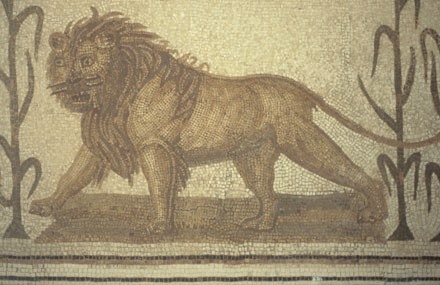
About the Language I
AFrom Stage 2 onwards, you have met sentences like these:
amīcus puellam salūtat.The friend greets the girl.
dominus servum vituperābat.The master was cursing
the slave.
puerī leōnem spectāvērunt.The boys watched the lion.
In each of these examples, the person who has something done to him or her is indicated in Latin by the accusative singular.
BIn Stage 8, you have met sentences like these:
amīcus puellās salūtat.The friend greets the girls..
dominus servōs vituperābat.The master was cursing
the slaves.
puerī leōnēs spectāvērunt.The boys watched the lions..
In these examples, the persons who have something done to them are indicated in Latin by the accusative plural.
CYou have now met the following cases:
| first declension | second declension | third declension |
| singular |
| nominative | puella | servus | mercātor |
| accusative | puellam | servum | mercātōrem |
| plural |
| nominative | puellae | servī | mercātōrēs |
| accusative | puellās | servōs | mercātōrēs |
DFurther examples:
1agricola gladiātōrem laudāvit. agricola gladiātōrēs laudāvit.
2servus agricolam interfēcit. servus agricolās interfēcit.
3centuriō servōs laudāvit.
4puer āctōrēs ad theātrum dūxit.
5senex āctōrem ad forum dūxit.
6amīcus fābulās nārrāvit.
7amīcī ancillam salūtāvērunt.
8agricolae nūntiōs audīvērunt.
pāstor et leō
ōlim pāstor in silvā ambulābat. subitō pāstor leōnem cōnspexit. leō
tamen pāstōrem nōn agitāvit. leō lacrimābat! pāstor, postquam
leōnem cōnspexit, erat attonitus et rogāvit,
“cūr lacrimās, leō? cūr mē nōn agitās? cūr mē nōn cōnsūmis?”
leō trīstis pedem ostendit. pāstor spīnam in pede cōnspexit, tum5
clāmāvit,
“ego spīnam videō! spīnam ingentem videō! nunc intellegō! tū
lacrimās, quod pēs dolet.”
pāstor, quod benignus et fortis erat, ad leōnem cautē vēnit et
spīnam īnspexit. leō fremuit, quod ignāvus erat.10
“leō!” exclāmāvit pāstor, “ego perterritus sum, quod tū fremis.
sed tē adiuvō. ecce! spīna!”
postquam hoc dīxit, pāstor spīnam quam celerrimē extrāxit. leō
ignāvus iterum fremuit et ē silvā festīnāvit.
posteā, Rōmānī hunc pāstōrem comprehendērunt, quod15
Christiānus erat, et eum ad arēnam dūxērunt. postquam arēnam
intrāvit, pāstor spectātōrēs vīdit et valdē timēbat. tum pāstor
bēstiās vīdit et clāmāvit, “nunc mortuus sum! videō leōnēs et
lupōs. ēheu!”
tum ingēns leō ad eum ruit. leō, postquam pāstōrem olfēcit, nōn20
eum cōnsūmpsit sed lambēbat! pāstor attonitus leōnem agnōvit et
dīxit,
“tē agnōscō! tū es leō trīstis! spīna erat in pede tuō.”
leō iterum fremuit, et pāstōrem ex arēnā ad salūtem dūxit.
| attonitus | astonished | hoc | this |
| trīstis | sad | extrāxit | pulled out |
| pedem | foot, paw | posteā | afterwards |
| ostendit | showed | comprehendērunt | arrested |
| spīnam | thorn | Christiānus | Christian |
| dolet | hurts | olfēcit | smelled, sniffed |
| benignus | kind | lambēbat | began to lick |
| fremuit | roared | agnōvit | recognised |
| exclāmāvit | shouted | ad salūtem | to safety |
| adiuvō | help | | |
About the Language II
AStudy the following pairs of sentences:
Pompēiānī erant īrātī.Pompēiānī erant īrātissimī.
The Pompeians were angry.The Pompeians were very angry.
gladiātor est nōtus.gladiātor est nōtissimus.
The gladiator is famous.The gladiator is very famous.
māter erat laeta.māter erat laetissima.
The mother was happy.The mother was very happy.
The words in bold type are known as superlatives. Notice how they are translated in the examples above.
BA few superlatives are formed in a different way:
mōns est pulcher.mōns Vesuvius est pulcherrimus.
The mountain is beautiful.Mount Vesuvius is very beautiful.
CFurther examples:
1mercātor est trīstis. senex est trīstissimus.
2canis erat ferōx. leō erat ferōcissimus.
3amīcus fābulam longissimam nārrāvit.
4murmillōnēs erant fortēs, sed rētiāriī erant fortissimī.
5Melissa erat pulcherrima.
A duel reaches its climax in this painting from a tomb at Pompeii.
Practicing the Language
AComplete each sentence with the correct word from the box. Then translate the sentence.
| ego | amīcōs | vēndō |
|
|
| tū | leōnēs | spectās |
|
|
1. . . . . multās vīllās habeō.4ego . . . . . salūtō.
2ego servōs . . . . . .5. . . . . ancillās laudās.
3tū gladiātōrēs . . . . . .6tū . . . . . agitās.
BComplete each sentence with the right word from the parentheses. Then translate the sentence.
1tū es vēnālīcius; tū servōs in forō (vēndō, vēndis, vēndit).
2ego sum gladiātor; ego in arēnā (pugnō, pugnās, pugnat).
3Fēlīx est lībertus; Fēlīx cum Caeciliō (cēnō, cēnās, cēnat).
4ego multōs spectātōrēs in amphitheātrō (videō, vidēs, videt).
5tū in vīllā magnificā (habitō, habitās, habitat).
6Rēgulus hodiē diem nātālem (celebrō, celebrās, celebrat).
7tū saepe ad amphitheātrum (veniō, venīs, venit).
8ego rem (intellegō, intellegis, intellegit).
CThe following words, in the accusative plural, occur in the accusative singular in the pāstor et leō story (page 131). Find the accusative singular forms in the story. Make a three-columned chart for first, second, and third declension, and list each singular and plural pair in the proper column.
leōnēspāstōrēs
spīnāsarēnās
Then find the accusative plural forms for the following singular nouns, and continue the chart:
lupum
bēstiam
spectātōrem
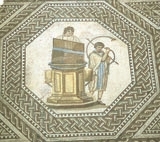 Gladiator fights were often performed to the sound of trumpet and organ.
Gladiator fights were often performed to the sound of trumpet and organ.
Gladiatorial Shows
Among the most popular entertainments in all parts of the Roman world were shows in which gladiators fought each other. These contests were usually held in an amphitheātrum (amphitheater). This was a large oval building, without a roof, in which rising tiers of seats surrounded an arēna. Canvas awnings, supported by ropes and pulleys, were spread over part of the seating area to give shelter from the sun. The amphitheater at Pompeii was large enough to contain the whole population as well as many visitors from nearby towns. Spectators paid no admission fee as the shows were given by wealthy individuals at their own expense.
Bird’s-eye view of the amphitheater showing the awning. Compare the drawing on page 124. The building held around 20,000 people, and the number of seats was being increased when the city was destroyed.
Among the many advertisements for gladiatorial shows that are to be seen painted on the walls of buildings is this one:
Twenty pairs of gladiators, given by Lucretius Satrius Valens, priest of Nero, and ten pairs of gladiators provided by his son will fight at Pompeii from 8 to 12 April. There will also be an animal hunt. Awnings will be provided.
Soon after dawn on the day of a show, the spectators would begin to take their places. A trumpet (tuba) blared and priests came out to perform the religious ceremony with which the games began. Then the gladiators entered in procession, paraded round the arena, and saluted the sponsor of the show. The gladiators were then paired off to fight each other, and the contests began.
The gladiators were slaves, condemned criminals, prisoners of war, or free volunteers; they lived and trained in a school or barracks under the supervision of a professional trainer.
Part of the program of one particular show, together with details of the results, reads as follows:
A Thracian versus a Murmillo
Won: Pugnax from Nero’s school:
3 times a winner
Died: Murranus from Nero’s school:
3 times a winner
A heavily armed gladiator versus a Thracian
Won: Cycnus from the school of Julius:
8 times a winner
Allowed to live: Atticus from the school of Julius:
14 times a winner
Chariot Fighters
Won: Scylax from the school of Julius:
26 times a winner
Allowed to live: Publius Ostorius:
51 times a winner

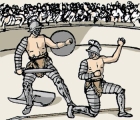
The fight ended with the death or surrender of one of the gladiators. The illustrations above, based on a relief from the tomb of a wealthy Pompeian, show the defeated gladiator appealing to the spectators; the victor stands by ready to kill him if they decide that he deserves to die. Notice the arm raised in appeal. The spectators indicated their wishes by turning their thumbs up or down: probably turning the thumb up towards the chest meant “kill him,” while lowering the thumb to the closed fist meant “let him live.” The final decision for death or mercy was made by the sponsor of the games. It was not unusual for the life of the loser to be spared, especially if he were a well-known gladiator with a good number of victories to his credit. The most successful gladiators were great favorites with the crowd and received gifts of money from their admirers. One popular Pompeian gladiator was described as suspīrium puellārum, “the girls‘ heartthrob.” Eventually, if a gladiator survived long enough or showed great skill and courage, he would be awarded the wooden sword. This was a high honor and meant he would not have to fight again.
Gladiators’ Armor
Gladiators were not all armed in the same way. Some, who were known as Samnites, carried an oblong shield and a short sword; others, known as Thracians, had a round shield and a curved sword or dagger. Another type of gladiator armed with sword and shield wore a helmet with a crest shaped like a fish; the Greek name for the fish was “mormillos” and the gladiator was known as a murmillō. The murmillones were often matched against the rētiāriī who were armed with rētia (nets) and three-pronged tridents.
Other types of gladiator fought with spears, on horseback, or from chariots. Occasionally women gladiators were used, bringing additional variety to the show.
A great deal of gladiators’ armor was discovered at Pompeii with traces of fabrics embroidered with gold thread. The performers must have looked spectacular, like modern circus artists - except for the bloodshed. Here are two sorts of helmet, a retiarius’ neck-guard, a greave (leg-protector) and a shield.
Animal Hunts
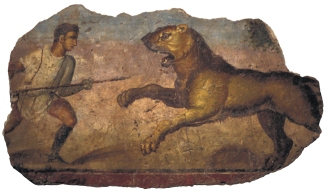
Many shows also offered a vēnātiō, a hunt of wild animals. The bēstiae (wild beasts) were released from cages into the arena, where they were hunted by specially trained beast-fighters called bēstiāriī. In the illustration below, you can see a wolf, hares, a wild boar, a bull, and a lion.
The hunters, who wore light clothing, relied only on a thrusting spear and their agility to avoid injury. By the end of the hunt, all the animals, and occasionally a few hunters, had been killed, and their bodies were dragged out from the sandy floor of the arena to be disposed of.
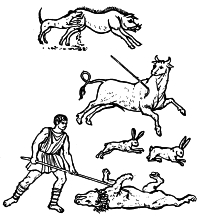
The Riot at Pompeii
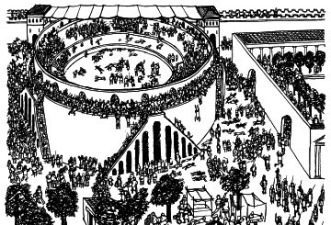
The story told in this Stage is based on an actual event which occurred in A.D. 59. In addition to the evidence given in the wall-painting (above), the event is also described by the Roman historian Tacitus in these words:
About this time, a slight incident led to a serious outburst of rioting between the people of Pompeii and Nuceria. It occurred at a show of gladiators, sponsored by Livineius Regulus. While hurling insults at each other, in the usual manner of country people, they suddenly began to throw stones as well. Finally, they drew swords and attacked each other. The men of Pompeii won the fight. As a result, most of the families of Nuceria lost a father or a son. Many of the wounded were taken to Rome, where the Emperor Nero requested the Senate to hold an inquiry. After the investigation, the Senate forbade the Pompeians to hold such shows for ten years. Livineius Regulus and others who had encouraged the riot were sent into exile.
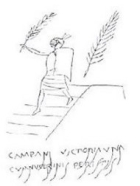 This drawing of a gladiator with the palm of victory was scratched on a wall with a message that may refer to the riot and its aftermath. “Campanians, in your moment of victory you perished along with the Nucerians.”
This drawing of a gladiator with the palm of victory was scratched on a wall with a message that may refer to the riot and its aftermath. “Campanians, in your moment of victory you perished along with the Nucerians.”
Word Study
AGive the Latin word from which these words are derived:
1gladiator
2portal
3Pennsylvania
4agitator
5incite
6spectacle
7renounce
8inhabitant
BMatch the derivative and its meaning:
1facileato reason earnestly with someone
2sanguinebeager to fight, quarrelsome
3totalitariancchildish
4pedestriandachieved with little difficulty
5expostulateecheerfully optimistic
6pugnaciousfto condemn openly; censure
7puerilegvery ordinary, commonplace
8denouncehupheld by authoritarian means
CGive the derivatives of dūcit suggested in the phrases below.
1To take an amount from the total: --duce.
2A ceremony taking new members into an organization: --duct---.
3Easily taking shape or easily molded: duct---.
4The leader of an orchestra: ---duct--.
5Taken away by a kidnapper: --duct--.
6Applying in a specific case a conclusion taken from a generality: --duct---.
Stage 8 Vocabulary Checklist
| agitat: agitāvit | | chases, hunts |
| cōnsūmit: cōnsūmpsit | | eats |
| dūcit: dūxit | | leads |
| eum | | him |
| facile | | easily |
| ferōx | | fierce, ferocious |
| gladius | | sword |
| habitat: habitāvit | | lives |
| hic | | this |
| ignāvus | | cowardly (also lazy |
| | in other contexts) |
| incitat: incitāvit | | urges on, encourages |
| nūntius | | messenger |
| pēs | | foot, paw |
| porta | | gate |
| postulat: postulāvit | | demands |
| puer | | boy |
| pugnat: pugnāvit | | fights |
| recumbit: recubuit | | lies down, reclines |
| saepe | | often |
| sanguis | | blood |
| silva | | woods, forest |
| spectāculum | | show, spectacle |
| statim | | at once |
| tōtus | | whole |
A retiarius who lost his fight. The symbol beside his trident is θ (theta), the first letter of the Greek word for death (thanatos).
